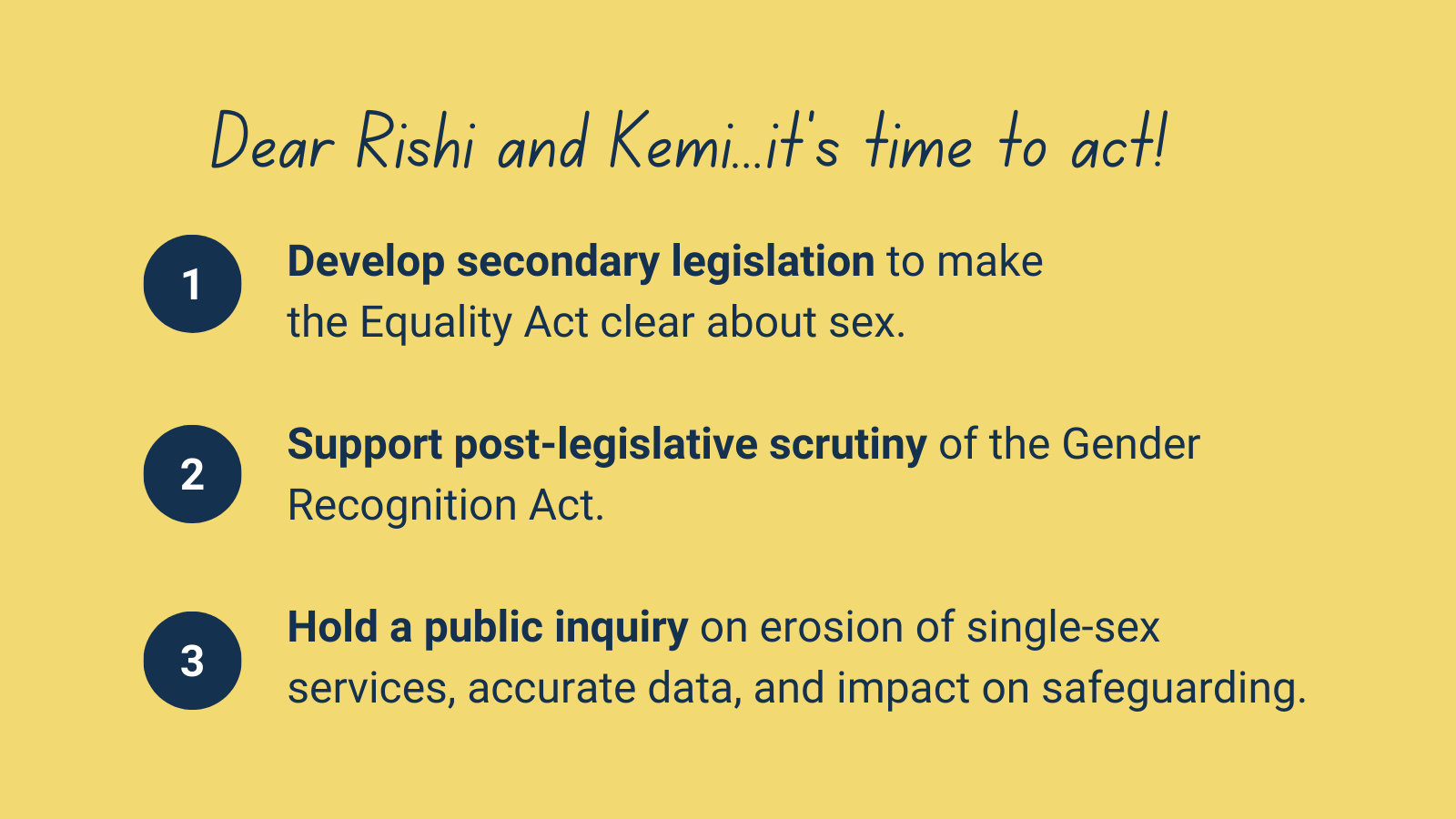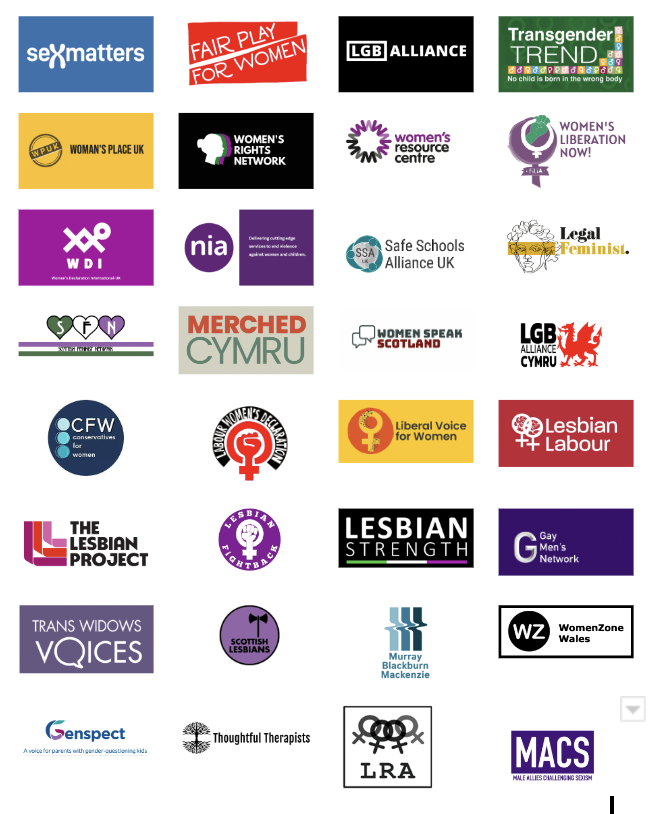It’s time to act
Following the judgment in the For Women Scotland appeal, it is time for the government to act.

Together with a host of groups concerned with women’s rights, lesbian and gay rights, children’s rights and safeguarding, we have written to the Prime Minister and to the Minister for Women and Equalities calling on them to take action.
Dear Rishi Sunak and Kemi Badenoch
It is time to act.
Yesterday the Court of Session in Scotland delivered a shocking verdict in a case brought by grassroots women’s rights group For Women Scotland, and supported by Sex Matters as an intervenor.
The court declared that in the law about sex discrimination and single-sex services, the terms “man” and “woman” do not mean actual sex, but only whether a person has a certificate declaring them to be male or female.
A certificate can be obtained by submitting a few documents that show a person has changed their name for the past two years, together with two doctors’ reports supporting their self-reported feelings of “gender dysphoria”. Being a pregnant woman is no bar to getting a certificate as a “man” and being a rapist is no barrier to getting a certificate as a “woman”. Neither is the certificate forfeit when a “man” gets pregnant and gives birth or when a “woman” commits indecent exposure or rape.
The Scottish court declared that having a certificate is not simply about relations between the individual and the state in matters such as marriage and pensions, but changes someone’s sex for the purposes of the Equality Act, affecting their relations with employers, service-providers, public authorities and other individuals, and even their sexual orientation. The judgment stated that “there is no such thing as being ‘legally lesbian’ and we have not identified a problem which would require that sex be referable to biology alone”.
This is in stark contrast to what we have been told for more than a decade about gender-recognition certificates. It means that:
- A fully intact man who obtains a certificate can apply to join a women’s association such as a self-help group of survivors of sexual violence, or an association of lesbians, and if he is turned away he can sue for discrimination.
- A young woman who obtains a certificate saying she is a man loses all protection against sex discrimination in relation to being female.
- A man who obtains a certificate has the right to access services provided for women, from changing-rooms and showers to women’s refuges and single sex wards. Service providers will need to have in-depth knowledge of the law to turn him away. Most will be too afraid and will instead tell women that they must accept him as a woman. Many women will self-exclude.
- A man who gets a certificate will be able to be appointed to a job which is advertised as being just for women, such as providing intimate care at home to elderly or disabled women.
- Sporting organisations will be forced to include males with certificates in training, funding and leadership development programmes for women’s sports.
- Employers will be told not to think about pregnancy and maternity discrimination as something that happens to women, but instead to “pregnant people” of both sexes.
- A gender-recognition certificate is seen as changing a straight man into a lesbian, and a lesbian into a straight man. It fundamentally changes the definition of sexual orientation in the Equality Act.
- When it comes to the public sector equality duty, public bodies, including prisons, hospitals and local councils funding refuges, will be told that they should not think of the need of natal women as a group, but only “women” including those who are actually men but who have a certificate.
In several areas there are narrowly drawn exceptions that may provide a defence to employers, public bodies and service-providers that continue to operate with regard to actual sex, and that are willing to take the risk of being sued; but experience shows that few are. Women-only services are disappearing up and down the country.
We do not believe this is what Parliament intended, and we understand it could still be challenged. But it is not right that thousands of individual women and men may again have to fundraise to take this battle on to the Supreme Court. Nor is it right that the Equality and Human Rights Commission has left it to these self-funding groups to make the legal and human rights arguments.
The judges in the For Women Scotland case had only one day of hearing to consider the question of whether the law on sex discrimination is no longer about sex. They heard no evidence from witnesses. They rightly said in their judgment: “This is an area on which individuals and organisations hold firm, even entrenched views, where there is intense public debate. At its heart are matters of social policy which are best addressed by parliaments.” Similar statements have been made in every recent court judgment on controversies over women’s rights and transgender demands.
Politicians say they know what a woman is. But these are cheap words when those politicians do not step up and protect women’s rights, and the clarity of language, rules and laws that are needed to defend those rights.
In June this year a Westminster Hall debate was held on the proposal to amend the Equality Act to make clear that sex means actual sex. More than 110,000 people signed the petition, and 25 MPs took part. Support for the petition was particularly strong in Scotland, where the Scottish Government’s attempt to relax even further the conditions for grant of a GRC alerted many people to the dangers this would pose for women. The response to the petition showed a real appetite for change.
We call on you now to:
- Commit to publishing a proposal for secondary legislation to clarify the relationship between the Equality Act and the Gender Recognition Act, and to urgently consult on it, with a view to introducing it in the next Parliament.
- Support the development of a post-legislative scrutiny committee in Parliament to consider how the Gender Recognition Act is working in practice, whether it is consistent with women’s rights and whether it needs to be reformed, and how it relates to reserved and devolved powers.
- Hold a public inquiry on the erosion of protection for single-sex services, spaces and data, and the impact of this on safeguarding, which brings together experts and stakeholders from different groups and perspectives and allows all views to be heard.
Kind regards

